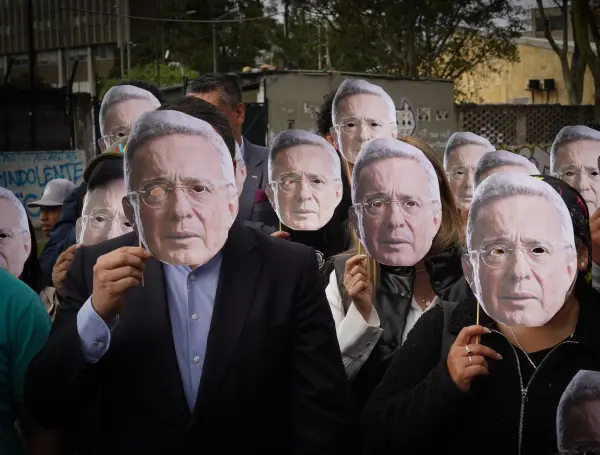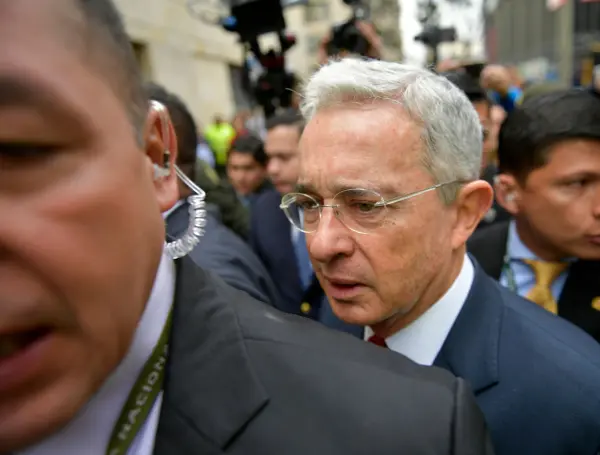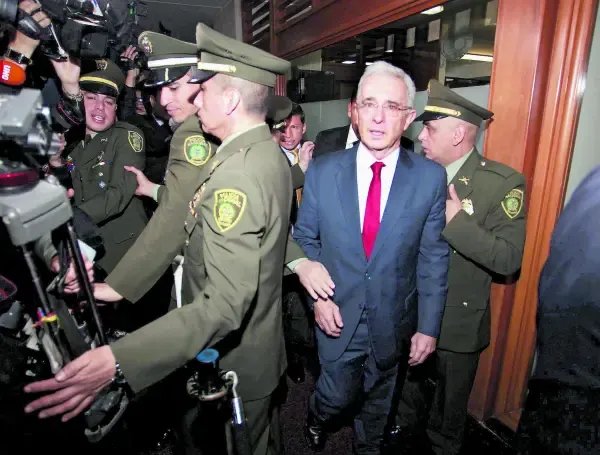In a 1,114-page ruling, Judge Sandra Liliana Heredia found the former president responsible for the crimes of procedural fraud and bribery in criminal proceedings, and imposed a sentence of 12 years of house arrest.
The judge ordered the immediate detention of former President Uribe at his residence in Rionegro, despite the fact that decisions by the Courts have indicated that in those cases in which the convicted person does not represent a risk to society or the progress of the case and has appeared in court, they may remain free until the decision against them has been ratified by the second instance.
In Uribe's case, his defense has already announced an appeal to the Superior Court of Bogotá. The judge has indicated that Uribe must be immediately confined to preserve peaceful and harmonious coexistence among citizens.

In an argument that has generated controversy, Judge Heredia states:"We have that the immediate deprivation of liberty is necessary to ensure the preservation of peaceful and harmonious coexistence among citizens. This measure not only has a deterrent and intimidating effect that prevents the commission of crimes against the person involved and nationals, but also prevents the negative perception in society that people can continue enjoying their freedom despite a conviction, when the requirements for this are not met and the presumption of innocence has already been dismissed in the first instance; especially when it comes to a person who enjoys public and social recognition, a reference for large circles in the country, hence allowing him to continue exercising his free movement, despite the transgression caused, would conceive the erroneous idea that equality before the law does not preexist in the legal system, ergo, to sustain power deterrent to the rule of law and confidence in institutions, his swift arrest is imperative."
And he also argues: "We must highlight, given the occupations he stated he carried out, his great international recognition, it is easy for him to leave the country to avoid the imposed sanction."
In the operative part of the sentence, in its third point it states:"Grant the convicted person the penal subrogation of house arrest regulated by article 38B of Law 599 of 2000, under the obligation to comply with the provisions of article 38B, numeral 4 of Law 599 of 2000 - added by article 23 of Law 1709 of 2014 -, upon prior bail or judicial policy, to guarantee compliance with its obligations, for the sum of four current legal monthly minimum wages."
But it is point 4 of the sentence that sparked the controversy, since it commissions the Judicial Services Center of Rionegro, Antioquia," to sign the commitment diligence before said center and issue the corresponding incarceration warrant, and the prison establishment in charge of surveillance must proceed with his immediate transfer to his home where he will serve house arrest, and the respective controls will be carried out."

The debate
Regarding the decision, criminal lawyer Francisco Bernate believes that"no one could have imagined such a situation; there was not a single prediction, not even from the Attorney General's Office, that would have gotten this right."
"A 12-year prison sentence, when the range was between 7 and 9, but also ignoring all the precedents from all the courts, tribunals, and tribunals that order arrest once they are final. It's truly beyond all expectations, and the only thing the defense can do now is file a writ of protection so the former president can defend himself in freedom without prejudice to appeal, but it's a decision that undoubtedly no one could have anticipated, not even the Attorney General's Office," Bernate said.

Criminal lawyer Fabio Humar called the decision "harsh" and said that a maximum sentence of nine years was expected, but 12 is excessive."The law even establishes that the decision does not become final until it is reviewed by the Supreme Court's Cassation Chamber, not even the Bogotá Court. Uribe has collaborated and appeared throughout the process. He is a public figure who has always been accompanied by the police; everyone knows where he is and where he lives. The decision is exaggerated," said the lawyer.
For his part, criminal lawyer Víctor Mosquera, who is part of the former president's defense team, rejected the arbitrary, early and unjust deprivation of liberty of Álvaro Uribe Vélez. Without a final judgment and without the appeal having been resolved, the presumption of innocence is violated. The judge is acting with bias and excess, anticipating the fulfillment of the sentence without superior control.
Attorney Saúl León stated that"based on the principle of favorability, Uribe should remain free until his case is resolved on the merits. The Court has held that, as long as the conviction is not final, the defendant may remain free. However, there are other legal criteria that allow for detention to be ordered from the moment the verdict is announced. Since these criteria are contradictory, the principle of favorability in criminal matters should be applied and he should be allowed to defend himself in freedom."
For his part, Juan Francisco Navarrete, a criminal and procedural lawyer, noted that the judge, at the time she announced the ruling, also defined the president's freedom status and upheld it.
"If the sentence includes in the operative part the established sentence and house arrest, this could only be fulfilled when the sentence becomes final, and the sentence is not final because the sentence still has the possibility of being appealed. So what will happen is that this is what the court has to define at the time it resolves the appeal," said the jurist.

